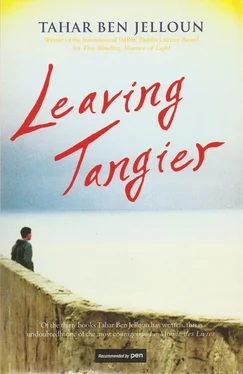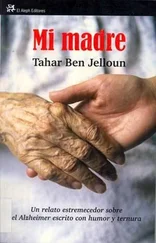Tahar Ben Jelloun - Leaving Tangier
Здесь есть возможность читать онлайн «Tahar Ben Jelloun - Leaving Tangier» весь текст электронной книги совершенно бесплатно (целиком полную версию без сокращений). В некоторых случаях можно слушать аудио, скачать через торрент в формате fb2 и присутствует краткое содержание. Год выпуска: 2009, Издательство: Arcadia Books, Жанр: Современная проза, на английском языке. Описание произведения, (предисловие) а так же отзывы посетителей доступны на портале библиотеки ЛибКат.
- Название:Leaving Tangier
- Автор:
- Издательство:Arcadia Books
- Жанр:
- Год:2009
- ISBN:нет данных
- Рейтинг книги:5 / 5. Голосов: 1
-
Избранное:Добавить в избранное
- Отзывы:
-
Ваша оценка:
- 100
- 1
- 2
- 3
- 4
- 5
Leaving Tangier: краткое содержание, описание и аннотация
Предлагаем к чтению аннотацию, описание, краткое содержание или предисловие (зависит от того, что написал сам автор книги «Leaving Tangier»). Если вы не нашли необходимую информацию о книге — напишите в комментариях, мы постараемся отыскать её.
Leaving Tangier — читать онлайн бесплатно полную книгу (весь текст) целиком
Ниже представлен текст книги, разбитый по страницам. Система сохранения места последней прочитанной страницы, позволяет с удобством читать онлайн бесплатно книгу «Leaving Tangier», без необходимости каждый раз заново искать на чём Вы остановились. Поставьте закладку, и сможете в любой момент перейти на страницу, на которой закончили чтение.
Интервал:
Закладка:
Tahar Ben Jelloun
Leaving Tangier
Translator’s Note
Leaving Tangier is about leaving home: emigrating, going into exile, taking leave of one’s country, one’s friends and family, even one’s senses. The many ties that bind the characters in Leaving Tangier to what they have left behind tug on their heartstrings in different ways, some of which evoke geographical, historical, or cultural references to a world that may well be unfamiliar to an English reader. I have provided endnotes to illuminate the meaning of such allusions, and an asterisk by a word in the text means that the term is explained in these notes at the end of the book.
~ ~ ~
My Cameroonian friend Flaubert says ‘Here I am!’ when he’s leaving and ‘We’re together!’ to say goodbye. A way to ward off bad luck. In this novel, those who leave aren’t planning to return, and when they leave someone, it’s for good. Flaubert, who studied a few pages of Madame Bovary in school, has promised to read this entire book as soon as summer vacation begins, when he goes home.
1. Toutia
IN TANGIER, in the winter, the Café Hafa* becomes an observatory for dreams and their aftermath. Cats from the cemetery, the terraces, and the chief communal bread oven of the Marshan district gather round the café as if to watch the play unfolding there in silence, and fooling nobody. Long pipes of kif pass from table to table while glasses of mint tea grow cold, enticing bees that eventually tumble in, a matter of indifference to customers long since lost to the limbo of hashish and tinselled reverie. In the back of one room, two men meticulously prepare the key that opens the gates of departure, selecting leaves, then chopping them swiftly and efficiently. Neither man looks up. Leaning back against the wall, customers sit on mats and stare at the horizon as if seeking to read their fate. They look at the sea, at the clouds that blend into the mountains, and they wait for the twinkling lights of Spain to appear. They watch them without seeing them, and sometimes, even when the lights are lost in fog and bad weather, they see them anyway.
Everyone is quiet. Everyone listens. Perhaps she will show up this evening. She’ll talk to them, sing them the song of the drowned man who became a sea star suspended over the straits. They have agreed never to speak her name: that would destroy her, and provoke a whole series of further misfortunes. So the men watch one another and say nothing. Each one enters his dream and clenches his fists. Only the waiters and the tea master, who owns the café, remain outside the circle, preparing and serving their fare with discretion, coming and going from terrace to terrace without disturbing anyone’s dream. The customers know one another but do not converse. Most of them come from the same neighbourhood and have just enough to pay for the tea and a few pipes of kif. Some have a slate on which they keep track of their debt. As if by agreement, they keep still. Especially at this hour and at this delicate moment, when their whole being is caught up in the distance, studying the slightest ripple of the waves or the sound of an old boat coming home to the harbour. Sometimes, hearing the echo of a cry for help, they look at one another without turning a hair.
Yes, she might appear, and reveal a few of her secrets. Conditions are favourable: a clear, almost white sky, reflected in a limpid sea transformed into a pool of light. Silence in the café; silence on all faces. Perhaps the precious moment has arrived … at last she will speak!
Occasionally the men do allude to her, especially when the sea has tossed up the bodies of a few drowned souls. She has acquired more riches, they say, and surely owes us a favour! They have nicknamed her Toutia, a word that means nothing, but to them she is a spider that can feast on human flesh yet will sometimes warn them, in the guise of a beneficent voice, that tonight is not the night, that they must put off their voyage for a while.
Like children, they believe in this story that comforts them and lulls them to sleep as they lean back against the rough wall. In the tall glasses of cold tea, the green mint has been tarnished black. The bees have all drowned at the bottom. The men no longer sip this tea now steeped into bitterness. With a spoon they fish the bees out one by one, placing them on the table and exclaiming, ‘Poor little drowned things, victims of their own greediness!’
As if in an absurd and persistent dream, Azel sees his naked body among other naked bodies swollen by seawater, his face distorted by salt and longing, his skin burnt by the sun, split open across the chest as if there had been fighting before the boat went down. Azel sees his body more and more clearly, in a blue and white fishing boat heading ever so slowly to the centre of the sea, for Azel has decided that this sea has a centre and that this centre is a green circle, a cemetery where the current catches hold of corpses, taking them to the bottom to lay them out on a bank of seaweed. He knows that there, in this specific circle, a fluid boundary exists, a kind of separation between the sea and the ocean, the calm, smooth waters of the Mediterranean and the fierce surge of the Atlantic. He holds his nose, because staring so hard at these images has filled his nostrils with the odour of death, a suffocating, clinging, nauseating stench. When he closes his eyes, death begins to dance around the table where he sits almost every day to watch the sunset and count the first lights scintillating across the way, on the coast of Spain. His friends join him, to play cards in silence. Even if some of them share his obsession with leaving the country someday, they know, having heard this one night in Toutia’s voice, that they must not give in to the siren call of sadness.
Azel says not a word about either his plan or his dream. People sense that he is unhappy, on edge, and they say he is bewitched by love for a married woman. They believe he has flings with foreign women and suspect that he wants their help to leave Morocco. He denies this, of course, preferring to laugh about it. But the idea of sailing away, of mounting a green-painted horse and crossing the sea of the straits, that idea of becoming a transparent shadow visible only by day, an image scudding at top speed across the waves — that idea never leaves him now. He keeps it to himself, doesn’t mention it to his sister, Kenza, still less to his mother, who’s upset because he’s losing weight and smoking too much.
Even Azel has come to believe in the story of she who will appear and help them to cross, one by one, that distance separating them from life, the good life, or death.
2 . Al Afia
WHENEVER AZEL LEAVES that sea-green circle of silent and lonely reverie, he feels cold and shivers slightly, no matter what the season. Instinctively, he turns away from the night, refusing to enter it. He walks in the city, speaking to no one, imagining that he is a tailor, a special kind of couturier, sewing the narrow lanes to the wide avenues with white thread, as in that story his mother used to tell him when he had trouble falling asleep. He wants to find out if Tangier is a man’s djellaba* or a bride’s caftan, but the city has grown so much that his quest becomes hopeless.
One February night in 1995, Azel decided to abandon his sewing, convinced that Tangier was no longer a garment but one of those synthetic wool blankets brought back from Belgium by émigrés. The city was hidden beneath a fabric that trapped warmth without dispelling humidity. Tangier no longer had any shape, any centre; instead, it had lopsided public squares from which cars had dislodged the peasant women who once came from Fahs to sell their fruits and vegetables.
Читать дальшеИнтервал:
Закладка:
Похожие книги на «Leaving Tangier»
Представляем Вашему вниманию похожие книги на «Leaving Tangier» списком для выбора. Мы отобрали схожую по названию и смыслу литературу в надежде предоставить читателям больше вариантов отыскать новые, интересные, ещё непрочитанные произведения.
Обсуждение, отзывы о книге «Leaving Tangier» и просто собственные мнения читателей. Оставьте ваши комментарии, напишите, что Вы думаете о произведении, его смысле или главных героях. Укажите что конкретно понравилось, а что нет, и почему Вы так считаете.












